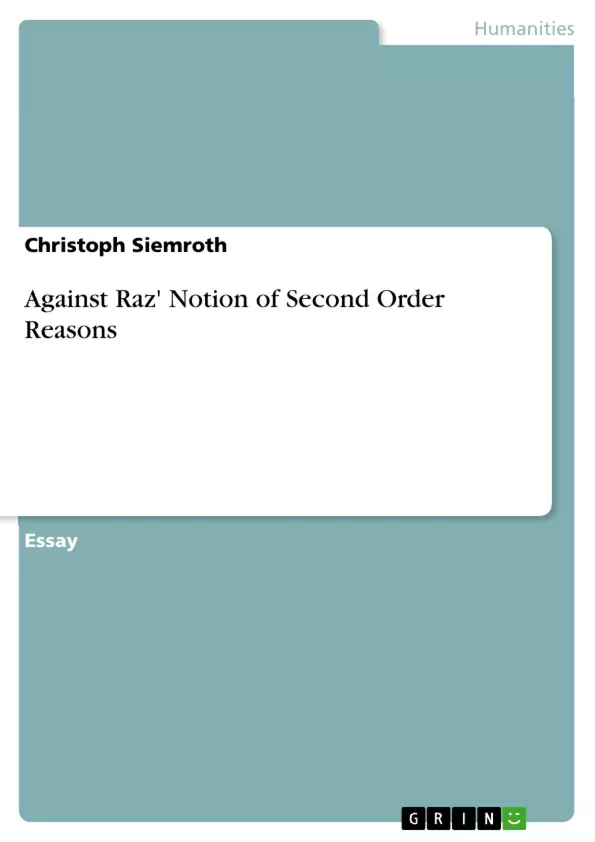The essay is a critique of Joseph Raz' concept of second order reasons, especially exclusionary reasons, as presented in chapter one of his 1975 book "Practical Reason and Norms". It is argued that exclusionary reasons as defined by Raz have strange consequences that disqualify them from serious consideration. A counterproposal lays out how decision problems can be more plausibly interpreted as conflicts of first order reasons. His examples are reinterpreted in light of the counterproposal.
Inhaltsverzeichnis (Table of Contents)
- The Objective
- Raz' Account of Second Order Reasons
- Formalizing Reasons and the Whistleblowing Example
- Where Raz Faces Problems
- Second Order Reasons as First Order Reasons
- The Counterproposal
- Investing or not Investing, that is the Question: Ann's Example
- The Example of the Complying Soldier and the Noncompliant Subordinate
- Summary and Conclusion
Zielsetzung und Themenschwerpunkte (Objectives and Key Themes)
This essay aims to demonstrate that Joseph Raz's explanation of second-order reasons and exclusionary reasons does not accurately represent the process of deliberation and decision-making. It argues that Raz's approach leads to illogical consequences and suggests a more plausible alternative, reducing second-order reasons to first-order reasons. The essay examines Raz's whistleblowing example and other scenarios to illustrate the shortcomings of his model.
- Analysis of Joseph Raz's concept of second-order reasons
- Critique of Raz's approach through the lens of the whistleblowing example
- Proposal of an alternative model where second-order reasons are reduced to first-order reasons
- Examination of the consistency of Raz's model with intuitive decision-making processes
- Assessment of the logical consequences of accepting Raz's account of second-order reasons
Zusammenfassung der Kapitel (Chapter Summaries)
The first chapter introduces the essay's objective to challenge Raz's description of second-order reasons. It argues that Raz's model leads to inconsistencies with intuitive decision-making processes. The essay will examine examples to demonstrate this discrepancy and propose an alternative model.
The second chapter delves into Raz's explanation of second-order reasons, employing the whistleblowing example. It explains the concept of exclusionary reasons, where a higher-order reason overrides a lower-order reason. This section also introduces the idea of "force" as a measure of the strength of reasons.
The third chapter presents arguments against Raz's approach, demonstrating the problematic consequences of blindly following exclusionary reasons. It suggests that accepting Raz's account would lead to decisions that ignore important ethical considerations.
The final chapter concludes with a summary of the key arguments and provides a concise overview of the proposed alternative model.
Schlüsselwörter (Keywords)
This essay focuses on the philosophical concept of second-order reasons, as presented by Joseph Raz, and examines its application in practical decision-making. The main themes include the critique of Raz's model of exclusionary reasons, the importance of consistent reasoning, and the role of intuitive decision-making in human behavior.
Frequently Asked Questions
What is Joseph Raz's concept of second-order reasons?
Raz defines second-order reasons as reasons to act (or refrain from acting) on other reasons, specifically focusing on "exclusionary reasons" that override lower-order reasons.
What is the main critique presented in this essay?
The essay argues that Raz's model leads to illogical consequences and fails to accurately represent how people actually deliberate and make decisions.
What is the "counterproposal" mentioned in the abstract?
The author suggests that decision problems should be interpreted as conflicts between first-order reasons rather than invoking a separate category of second-order reasons.
Which examples does the essay use to challenge Raz?
The essay reinterprets the whistleblowing example, Ann's investment example, and the scenario of the complying soldier.
What are the logical consequences of following exclusionary reasons blindly?
The critique suggests it would lead to decisions that ignore significant ethical considerations and intuitive reasoning processes.
- Citar trabajo
- Christoph Siemroth (Autor), 2009, Against Raz' Notion of Second Order Reasons, Múnich, GRIN Verlag, https://www.grin.com/document/126823



